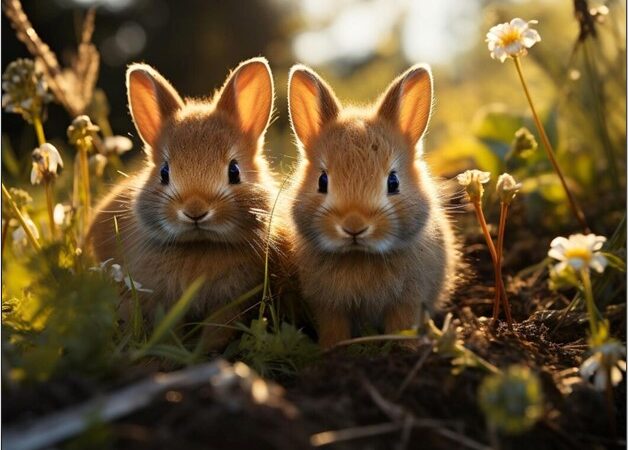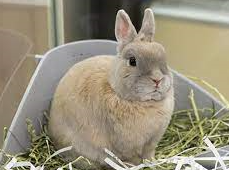Are You Considering Buying a Rabbit for your Kids?
Few children would say no to a pet rabbit if given the choice, and at Easter time when rabbit imagery and chocolate bunnies are all around us, many people’s thoughts turn to the idea of finally buying that elusive rabbit, and what better time of the year to do so!
However, buying a rabbit on a whim at Easter is not a smart move – no smarter than giving a puppy or a kitten as a Christmas gift. Unfortunately, many people view rabbits as low maintenance, cheap and easy pets to keep, which can just be bought, put in a hutch and fed and petted once a day, but this is not correct.
The most important thing to know about rabbits is that they are social creatures that don’t thrive alone, they need the company of their own kind. So if you are considering welcoming a rabbit to the family – make sure it lives together with a fellow rabbit!
Rabbits are classed as exotic animals, and they have fairly onerous care needs to keep them healthy, happy and thriving – a hutch is not enough, and what would have been considered appropriate care for a rabbit back twenty or thirty years ago is no longer appropriate, as our understanding of rabbits and their needs has grown.
In this article, we will explain why buying a rabbit on a whim over Easter is a very bad idea, and cover some of the elements involved in the correct care and husbandry of rabbits. Read on to learn more.
Surprise Pets are Never a Good Idea
It is something that has likely crossed every parents’ mind from time to time-the look on their children’s faces if you brought home a cute, fluffy and adorable small animal like a rabbit as a surprise gift for the kids. However, fantasy is just where this image should stay-picking up a pet is not something you should do the same day that the idea occurs to you, and you should spend at least a couple of weeks (and ideally longer) learning and researching rabbits, and getting together everything that you need to take care of them.
You should also ensure that you are fully aware of what caring for a rabbit involves, including the cost and time commitment and the willingness to do the nasty jobs-like cleaning out the hutch-for the entirety of the rabbit’s life, whether your children promise to help or not! The potential lifespan of a well cared for rabbit can run to ten to twelve years at the top end, and over eight generally with proper care. That is a long time – not many of us will know for sure where we might be in ten to twelve years in terms of family, living situation and work, and requires the ability to commit to caring for your rabbit come what may.
Also, it is a major plunder to think that your children’s enthusiasm will translate to eight to ten years of daily work caring for the rabbit, however much they promise to-and so you must be prepared to make this commitment for yourself, and not hope for the best!
Finally, caring for a rabbit is not as cheap as many people think. The cost of providing an appropriate hutch, run and other facilities for the rabbit can go into the hundreds, and food, straw, hay, and of course vaccinations, flea and worming treatments and veterinary care all add up quickly too.
What do Rabbits Really Need?
People who are not that familiar with rabbits often have a poor perception of what they actually need to be happy, comfortable, healthy and safe. ISPCA offers provides a list of requirements for a pet rabbit here.
First of all, while we may think or rabbits as living in hutches – and indeed, they commonly do-hutches were originally designed as rabbit houses to keep them close to the kitchens where they would have been turned into meals… Which goes to show that they were designed for convenience, and not the best interests of a long life in mind!
A rabbit’s hutch should be large – larger than many people think, at least six feet long by two feet wide and deep at a minimum. An outdoor run for grazing on grass is essential too, as is company – rabbits are social creatures that will not thrive alone, and they need to live with others of their kind. The common pairing of a rabbit and a Guinea pig is not appropriate for either species.
Rabbits need to eat almost continually or their digestive system grinds to a halt entirely, and can be hard to restart – the diet of the rabbit should be comprised of around 80% grass and hay, 15% fresh appropriate vegetables, and just a small amount of prepared rabbit pellets or food mixture.
Rabbits also need vaccinations just like cats and dogs, as well as flea treatments, and of course, a safe, secure living environment that is protected from foxes and other predators.
They also need toys, games and things to do, as well as a clean living environment and plenty of handling if they are to be tamed and friendly with people.
If you cannot commit to providing all of these things, and taking care of your pet’s day to day needs for the entire duration of their hopefully long lives – you should revaluate if you are ready for a pet!
Credit to: pets4homes.co.uk




